Kostas Georgakis- Genoa 19th September by David Roberts
On holiday in Corfu, we used to pass by a statue while wandering the old ow looking for a restaurant. I subsequently found out about the sad story of Kostas Georgakis. Then while looking for something else, I found out that on 19 September 2022, the City of Genoa, where he died had held a memorial service for the anniversary of his death. So, it seemed worthwhile writing it all up.
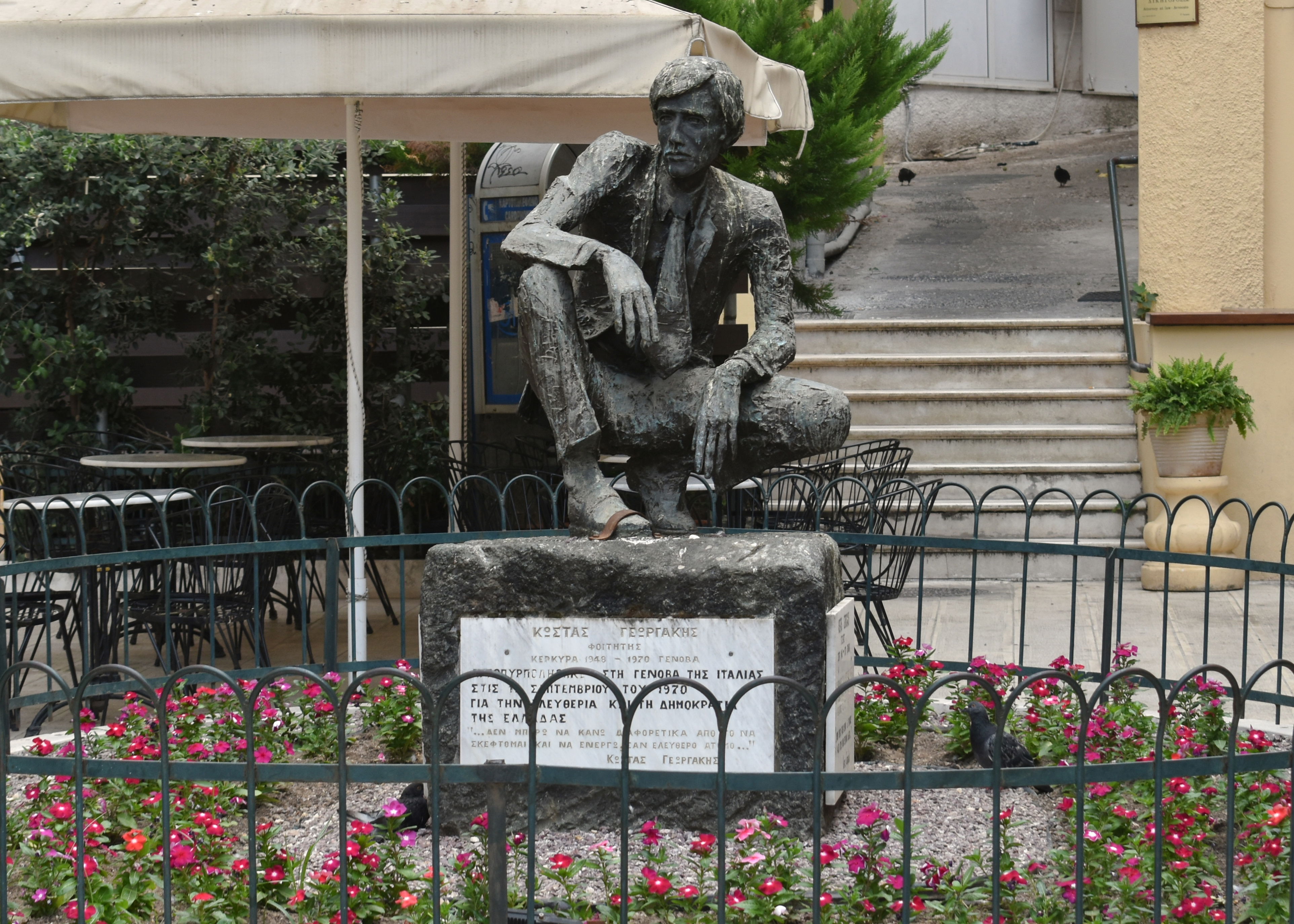
The statue of Kostas in the middle of Corfu town
Kosta Georgakis was born on the island of Corfu on 28 August 1948. The Italian and German invaders had left in 1944, to be replaced by a temporary British occupation. Corfu had been spared the horrors of the Greek Civil War. It was still an unspoiled sleepy place, yet to become a centre for mass tourism and the beaches and countryside remained much as they had done when Lawrence Durrell wrote about them in the 1930s. In the early 1960s the first charter flights started to arrive from Germany and Scandinavia, but Corfu remained largely quiet, retreat from holidaying film stars and the occasional rock star.
Then in 1967, everything changed when three Greek Colonels, Papadopoulos, Pattakos and Makarezos secretly planned and executed a Military Coup. The background of the coup goes back to the war and the Axis occupation, possibly even further back. One man had dominated the Greek political landscape for many years, Georgios Papandreou. Papandreou whose career stretched back to the pre-war years, had been arrested by the Italian for editing an illegal newspaper “Freedom”. Papandreou escaped from captivity and made it to Cairo, where he became head of the Greek Government in Exile. When the Axis forces evacuated Greece, he returned to Athens in October 1944 becoming Prime minister of the National Unity Government. The only problem was that there was not a lot of national unity. Working with British occupation force, he tried to normalize relations between the leftist forces of EAM/ELAS, the non-EAM resistance and former collaborationists. It did not really work. On 1st December 1944, the British ordered the unilateral disarmament of the EAM forces, sparking a huge protest rally in Athens. This quickly degenerated into violence when the Greek Police and Gendarmerie, opened fire killing 28 people and wounding 148 others, thus starting a full-blown confrontation known as the Dekemvarina (December Days) Papandreou resigned as Prime Minister, but continued to serve in senior Ministerial positions.
In 1961, Papandreou sought to revive Greek liberalism by funding the Centre Union Party , which was implacably opposed to the Parakratos, “the deep state of the Greek right. “. In 1963, he narrowly won an election and then in 1964, he won a landslide. However, his liberal progressive policies aroused considerable animosity from conservative forces. Chief among these was IDEA – a cadre of extreme right officers, many of whom had served with the Security Battalions, which had collaborated with Nazi occupation of the country. IDEA was allegedly subsidized by the CIA. Also lurking in the shadows, were the KYP (the Hellenic Intelligence service) and the Mountain Raider companies of the Greek Army (LOK ), who were part of NATO’s Stay Behind network in the event of a Soviet Invasion. There were even more dangerous players, luring further in the shadows, In 1964 Papandreou tried to dismiss several officers who were members of IDEA. King Constantine II who was antipathetic to liberal reforms, did not wish to see the officers dismissed, so he sacked Papandreou instead, provoking a political crisis, known as the Apostasia. After this long-running constitutional crisis, new elections were scheduled for 28 May 1967, which Papandreou was widely forecast to win.
Before the election could happen, the Colonels launched a coup d’état. Although they were a small minority in the Greek army, they were able to pass orders to their units who thought that they were coming from higher up the chain of command. Tanks occupied strategic positions in Athens, and the army started a roundup of some 10,000 suspected left-wingers using prepared lists. Most articles of the Greek constitution were suspended, and Papandreou and his son Andreas were arrested. If King Constantine had done something, the coup might have failed. The Royal Hellenic Navy, Air force and large parts of the army were not involved- but instead of going to join up with the Navy in Crete and resisting, Constantine chose not to and instead swore in the colonels as the legitimate government of Greece. That action probably cost him his throne. He then compounded his error, by launching an abortive and ill planned coup of his own. He was forced to flee the country, arriving in Rome on 14 December 1967.
On this occasion, despite their previous connections with the Greek Right Wing, the CIA probably had nothing to do with the coup and such was the secrecy of its planning that neither they nor the American Embassy knew much about it. While some Scandinavian countries held out for expelling Greece from NATO and the council of Europe, a more pragmatic view was led by the British and Germans who favoured “persuading “Greece to resign from the Council of Europe before they were kicked out. With a widely perceived threat from the Soviets on NATOs Southern Flank. expulsion from NATO was never realistically on the cards. Despite, the UK having a Labour government, the UK Foreign office pursued its usual policy of quietly recognising de facto governments and a brief arms embargo was quietly forgotten about. Although originally not supportive of the Colonels, the Italian Government eventually fell in with the British position. The Colonels were firmly entrenched in power and Greece knuckled down for what was to end up as six years of dictatorship.
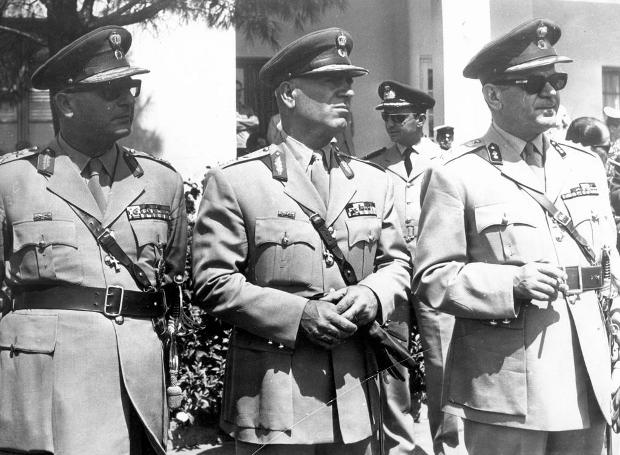
The Greek Colonels - Makarezos, Pattakos, Papadopoulos
While all this was happening , mass tourism was taking off and islands like Corfu would change forever as a result. The Colonels’ economic policy poured large amounts of money and concrete into developing tourist infrastructure, with a resulting rampant corruption. It was not just mass tourism. . Despite their reactionary outlook, the colonels were apparently prepared to tolerate the substantial numbers of hippies to Greece, so long as they kept their mouths shut about Greek politics and weren’t too open about the drugs. Somewhat surprisingly junta censors allowed wide access to Western music and films, even softcore pornography- so long as it was not political. In 1970 the film Woodstock was shown all over Greece, with reports of arrests and disturbances especially in Athens as youths flocked to see the film and filled theatres to capacity. Meanwhile, at Matala, Crete, a hippie colony which had been living in the caves since the 1960s was never disturbed. How the hippies reconciled enjoying a hedonistic lifestyle in a country under military rule, with most freedom suspended is another question.
In the 1960s , The Georgakis family were living at Samara Street in the heart of Corfu Town, five or ten minutes’ walk from the sea and from the Liston Square. Even in the 1960s Corfu Town still carried visible signs of the war ( it still does today ), there were the remains of bombed out buildings destroyed during Luftwaffe attacks in September 1943 and which the Greeks had never got round to demolishing or repairing. Kostas had been studying at the Liceo in Corfu Town, where he was by all accounts an excellent student, The Greek education system at the time was decidedly traditional, - backwards might even have been appropriate word.
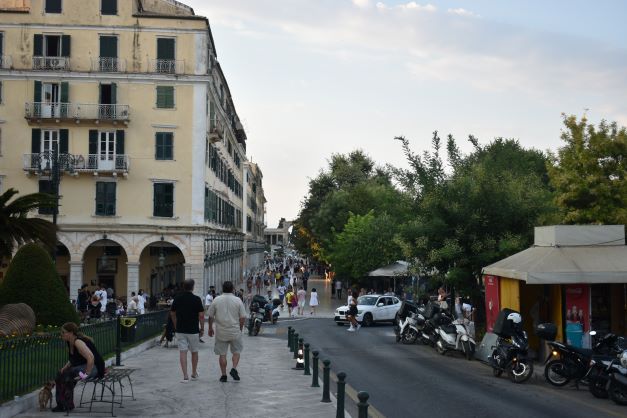
The centre of Corfu Town
Due to the inadequacy of the Greek university system, the coup even before middle-class Greeks often sent their children abroad to study. When Kostas graduated, he decided to go to Italy. Since the 1950s, there was a growing Greek student population in Italy. At the time, Italy particularly encouraged Greek Students and the Ministry of Public Instruction facilitated them and even provided study bursaries. By 1970, there were perhaps 10,000 Greek Students in Italy. Italy was convenient, in the days before cheap flights it was a shot ferry ride to Brindisi and then a train to most Italian cities. The ties between Italy and Greece were also old and deep rooted, in modern times both countries had struggled to gain national unity and independence. Despite the Italians having invaded Greece, following the armistice on 8 September 1943, many Italians had either individually or in whole units headed for the hills and joined the Greek resistance. The Greeks appreciated Italy for its freedom of political expression and is growing consumer culture. They also appreciated the pollical freedom and radicalism, contrasting the celebration of the 25th April (Liberation Day) with its red flag waving, the political graffiti and anti-authoritarianism. Greek students went home singing Bella Ciao in Italian, they got the meaning, the Greek spies probably did not. Italian intellectuals joined the protests against the Colonels, including Bertolucci and Pasolini. Film stars like Gianmaria Volente demonstrated outside the Greek Embassy in Rome. The exiled Greek actress, Irene Papas lived in Italy, where she was well known for playing Penelope in a popular Italian TV miniseries “L’Odissea” Meanwhile she called for a cultural boycott of Greece, referring to the Colonels as the “Fourth Reich “.
Italy became a centre for publishing anti- Junta newspapers and journals. Andreas Papandreou’s PAK socialist par received financial support from the PSI and moral support from socialist politicians Pietro Nenni and Sandro Pertini. Some Italians crossed the line from peacefully supporting the Greek exiles. A Milanese woman Maria Elena Angeloni managed to get blown up when a car bomb which she and a Greek comrade were preparing to detonate at the US Embassy in Athens, exploded prematurely. For some individuals the traditional communist party appeared to be passive in the face of the Colonels and instead of demonstrating and protesting they turned to an armed struggle instead. Some Italians were radicalised by their association with Greek exiles and later turned to terrorism themselves, some Greeks were radicalised in Italy. On the other side of the coin, extreme right Italians of the MSI, Forza Nuova and Avanguarda Nazionale were welcomed by the Colonels, were impressed by what they saw and retuned home to spread terror and destabilisation in Italy, Some allege that there was a Greek connection to the Piazza Fontana bombing, in Milan in 1969. If Italian radicalism might have helped to grow Greek terrorism, the Colonel’s regime blew back right wing terror in the other direction.
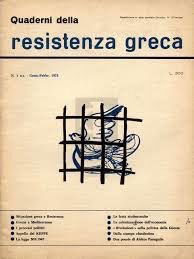
Italy became a centre for Greek Resistance publications
Kostas chose to study geology at the University of Genoa. The industrial port city of Genoa most have seemed a fairly safe place to take refuge. The whole city had been honoured with the Gold Medal for Resistance against the Nazis. In 1960s, there had been massive demonstrations against a congress of the Neo-fascist MSI and the inclusion of an MSI minister in the Government. 100,000 people turned out on the streets, dockers, workers and pensions and despite violent repression from out-of-town riot squads, they actually won the day The MSI never held its Congress and the government collapsed shortly afterwards. Although the Italian Right had been forced out of the city the Junta’s spies had not. His first three years seemed to have passed uneventfully, as he studied made Greek and Italian friends and found an Italian fiancée Rosanna.
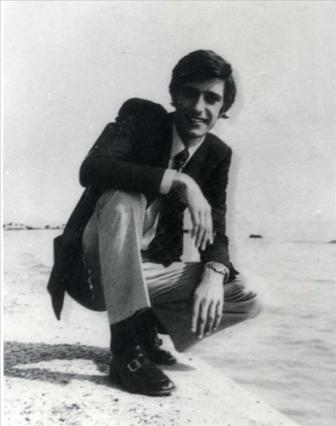
Kostas
On 26 July 1970, Kostas gave an anonymous interview to a Genovese magazine Sigla A, during which he revealed that the military junta's intelligence service had infiltrated the Greek student movement in Italy. In the interview he denounced the junta and its policies and stated that the intelligence service created the National League of Greek students in Italy and established offices in major university cities According to him, of the Greek students in Italy, around 15 were not actually students but paid informers of the Greek intelligence service ( KYP) , receiving stipends of around 150,000 to 250,000 lire a month. Apparently, the funds were disbursed by Greek Consulates in Genoa and Naples, with the cash arriving from Switzerland. .In a wide-reaching interview Kostas also alluded to the shadowy connections between the Italian Extreme Right and the Greek Colonels, apparently, they were paying for members of neo- the MSI to visit Greece on expenses paid missions . He also talked about the case of Nicola Kazioannu, a fellow student who had come to the notice of Greek intelligence, he had had his exemption from military service revoked and returned to Athens.
Shortly afterwards he was murdered. Somehow a copy of the recording of the interview was obtained by the Greek consulate and the identity of Kostas was established. For his remaining few months, he was now condemned to live in fear. Members of the junta student movement attacked him. He was convinced that he was being followed by a VW with Naples number plates ( Naples was a major NATO HQ, with a sizeable Greek spying community) In the third year of his studies and having passed the exams of the second semester he now found himself in the difficult position of having his military exemption rescinded by the junta as well as having the monthly stipend that he received from his family cut off. He must have feared that he was destined for the same fate that had befallen Kazioannu on his return to Athens. His family in Corfu also sent him a letter describing the pressure that the regime was applying to them. Fearing for his family, Kostas decided that he had to make an act to raise awareness in the West about the political predicament of Greece.
By most accounts, Kostas spent a fairly normal last day, visiting friends and eating out. The only strange tin was that he said he was worried that his FIAT 500 would run out of petrol, and he purchased van extra can of fuel as a reserve. He wrote a letter to his father and gave his fiancée Rosanna his windbreaker telling her to keep it because he would not need it any longer. Around 1:00 a.m. on 19 September 1970, Georgakis drove his Fiat 500 to the piazza Matteotti in the Centre of Genoa. According to eyewitness accounts by street cleaners working around the Palazzo Ducale there was a sudden bright flash of light in the area at around 3:00 am. At first, they did not realise that the flame was a burning man. Only when they got closer did they see Kostas running while ablaze shouting, "Long Live Greece", "Down with the tyrants", "Down with the fascist colonels" and "I did it for my Greece." The street cleaners added that at he refused their help and ran away from them when they tried to extinguish the fire. They also said that the smell of burning flesh was something they would never forget . They called an ambulance and at around 3.10 am Kosta was admitted to the Pronto Soccorso at the Ospedale San Martino in Genoa, he was in a critical condition, with 1st 2nd and 3rd Degree buns to his body. The emergency team did their very best for him, with continuous blood transfusions, Italian and Geek students queued up to give blood. Kostas stayed conscious long enough to ask the nurses to contact his friends and then he slipped into a coma. He died nine hours later at the Ospedale San Martino.
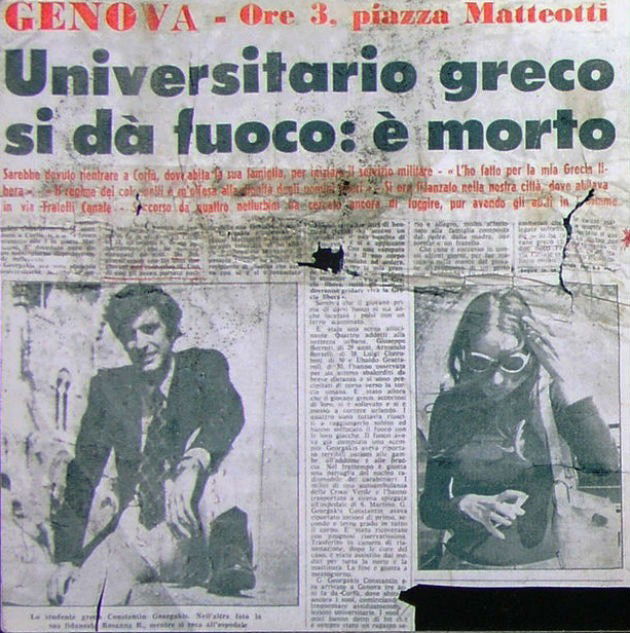
The Italian press reports the death of Kostas
News of Kostas’s death began to spread through the Greek services of foreign radio stations. In Corfu, Spyros Georgakis received a telephone call at home. The caller said that he was a friend of Kostas and that Kostas had been involved in a car accident and was at the San Martin hospital in Genoa. Spyros contacted the security commander in Corfu to get clearance to leave and to acquire foreign exchange, he was told that he could leave at once and he should go quickly. Possibly the Security Commander already knew what was going on. Later that day. Spyridon received a telegram from the Greek Consulate in Genoa “Your son is Seriously Injured in a Car Accident”. Spyridon left by Ferry for the Italian port of Brindisi, then by plane from Brindisi to Rome and on to Genoa. He was escorted from Brindisi by the Italian Police. At Brindisi airport an employee divulged the truth to Spyros who spoke fluent Italian. It was not a car accident. Kostas had set himself on fire. Spyridon collapsed and they had to hold the plane until he recovered. By that time Kostas was already dead. He did not arrive in Genoa until midnight where friends of Kostas took him to the Consulate. Apparently, the consul was new and had not previously known Kostas or been involved in the affair of the tapes. Knowing Spyridon had two other children, he warned him to be careful. The Consul’s wife told hm his son was a hero. The next morning everybody wanted to talk to Spyridon, the consul, his son’s friends, the Italian Press, students and his fiancée Rosanna. A Geek orthodox Priest accompanied Spyridon to the mortuary to identify Kostas.

Kostas's father Spyridon with Greek orthodox priest Father Mantas in Genoa
The Greek authorities were now in total panic, although they had not physically killed Kostas, it was bound to get out that their agents had assaulted him and that they were intimidating and threatening him. There was also the question of how they had managed to obtain the tape in the first place. The consul tied to get Spyros to read a fabricated statement in return for letting him take the body back to Corfu – They wanted the funeral over quickly and the whole issue to go away. The Greek Consul begged the Embassy for money to allow the father to repatriate Kostas’s body as soon as possible. The name that kept being mentioned was Jan Palach the Czech martyr who had burned himself to death as Soviet tanks entered Prague. The Greek regime was highly conscious of all the bad publicity they were going to receive.
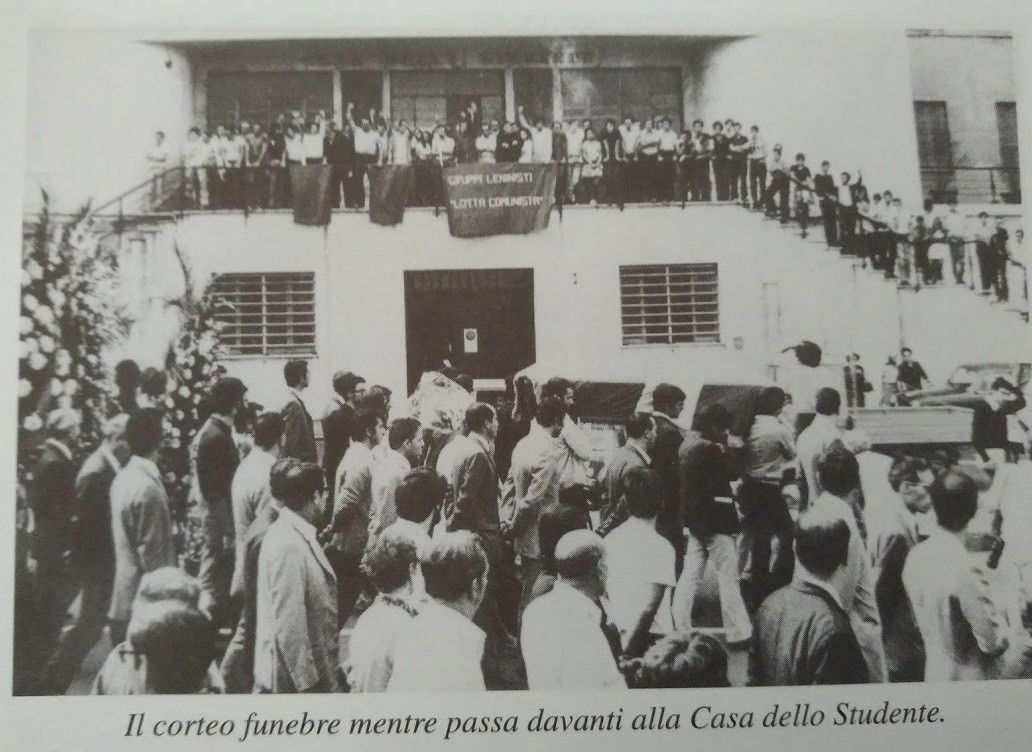
The funeral procession for Kostas passes the student House in Genoa
Genoa gave Georgakis a respectful send off. The Municipality of Genoa aid for the funeral and the while council turned yup. The vice- Mayor of Genoa delivered an oration on behalf of the city. On 23 September Melina Merkouri led a demonstration of hundreds of banner-waving Italian and Greek anti-junta resistance members during in his funeral procession. Merkouri was holding a bouquet of flowers for the dead hero. The number of people at the funeral was estimated at 1,500. The Junta was prepared to even disrupt the funeral. According to the Italian Press, Greek intelligence even tried to disrupt the funeral cortege. Greek students identified several agents provocateurs who were trying to politicize and disrupt the proceedings. Fortunately, they were prevented from doing so by the Italian Police. The Corriere della Sera, reported that although there had been some pro-communist chanting and a brief rendition of the Internationale. Most of the time the sign of the cross was more evidence than clenched fists. At the time of the coup, Merkouri was in the United States, playing in Illya Darling in Broadway. She immediately joined the struggle against the junta and started an international campaign, travelling all over the world to inform the public and contribute to the isolation and fall of the colonels. As a result, the regime revoked her Greek citizenship and confiscated her property. When her Greek citizenship was revoked, she said: "I was born a Greek and I will die a Greek. Those bastards were born fascists and they will die fascists" Alternatively, she might have said “Mr. Patakos, was born a Fascist and will die a Fascist “. The first version sounds better.
In exile in Paris was renowned composer Mikis Theodorakis. Theodorakis had been in the Greek resistance ELASs (the armed wing of the EAM) and had been arrested by the Italians during the war. Following the 1964 elections, Theodorakis became a member of the Greek Parliament, associated with the left-wing party EDA. The composer was black-listed by the Greek cultural establishment for his political beliefs and many of his songs were censored-or not allowed on the radio stations. He wrote the music for the film Zorba the Greek. Following the Coup, Theodorakis became a symbol of resistance to the Colonels. He went into hiding, called for resistance against the dictatorship and founded the "Patriotic Front" (PAM). On 1 June, the Colonels banned playing, and even listening to his music. Theodorakis was arrested on 21 August and jailed for five months. Following his release in January 1968, he was deported to Zatouna with his wife and their two children, then interned in the concentration camp of Oropo. Finally at the request of the French politician Jean-Jacques Servan-Schreiber, Theodorakis was allowed to go into exile to Paris on 13 April 1970. In Paris he was reunited with fellow exiles Costa Gavras and Melina Merkouri and then immediately hospitalized, suffering from tuberculosis. His wife and children joined him a week later in France, having travelled from Greece via Italy on a boat. In 1970, Theodorakis was especially popular in Italy, thanks to an album by the Italian singer Iva Zanicchi “Caro Theodorakis”, the album contained the track “Cantico dei Cantici” the original version came from a work which Theodorakis had originally written in 1965, “The Ballad of Mauthausen”. Mauthausen was the camp where most Italian prisoners ended up after September 1943. The Italians and Geeks had another shared history. From Paris, Theodorakis commented on Kostas’s sad fate
“With his gesture, the young man who has left us forever., wanted the world to see the tragedy that the Greek population was living through under the chains of tyranny. He demonstrated that the young people of Greece would not hesitate to make any sacrifice to liberate their country”.

Mikis Theodorakis and Melina Mercouri exiled from Greece.
in Rome, the Greek ambassador A. Poumpouras communicated to the junta that hundreds of workers and anti-junta resistance members accompanied Georgakis's body from the hospital to the mausoleum in Genoa where he was temporarily interred. In the afternoon of the same day a demonstration of about a thousand was held which was organised by leftist parties shouting "anti-Hellenic" and anti-American slogans according to the ambassador. According to the ambassador's message Italian police took security precautions around the Greek consulate at the time, at the request of the Greek Embassy in Rome. Kostas remained unburied for 4 months, housed in a mausoleum (well more like a shed) at the Staglieno cemetery in Genoa, Rosanna visited every week until one week the body was no longer there. To avoid further anti- Junta demonstrations on 13 January 1971 the remains of Georgakis were secretly transferred to the ship Astypalaia which put in specially at Genoa for the purpose and were taken to Greece, secretly transferred to Corfu and on 18 January 1971, still shrouded in secrecy his remains were taken to the municipal cemetery of Corfu Town. There was no public ceremony, and a single police car accompanied the Georgakis family, who were transported to the cemetery by taxi.
Although at the time, it must have seemed to Kostas that the Junta was entrenched for the long-term, in the end it collapsed under the weight of its own incompetence and corruption. On 14 November 1973, students at the Athens Polytechnic (Polytechneion) went on strike and started protesting against the junta Initially the authorities stood by, while the students demanded “Bread-Education-Liberty!”- then they sent the tanks in.
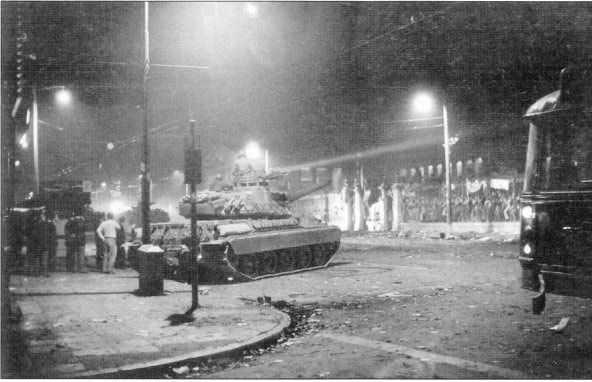
A junta tank during the brutal suppression of the uprising of the Athens Polytechnic
soon after Brigadier Dimitrios Ioannidis, a disgruntled junta hardliner and head of the feared Military Police, used the uprising as a pretext to stage another-coup that overthrew Papadopoulos and introduced martial law. The final straw was the Ioannidis sponsored by Ioannidis, on 15 July 1974 a coup d'état in Cyprus on 15 July 1974, which led to the Turkish invasion of the northern part of the island. Still playing Realpolitik, the rest of NATO decided that Turkey was rather more important to them than the Colonels and finally abandoned them, a national unity government was established and a transition back to Democracy began. In January 1975 the junta members were arrested and charged with high treason and insurrection, Papadopoulos, Pattakos, Makarezos (the three original colonels) and Ioannidis were sentenced to death for high treason. The sentences were later commuted to life imprisonment by the for-humanitarian reasons.
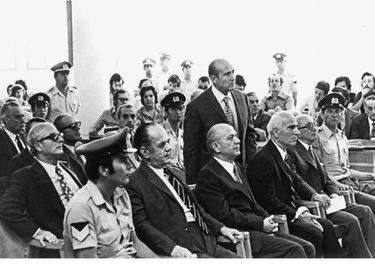
"Hangmen Also die1- The Greek Colonels on trial for their lives for High treason and Insurrection. The death sentences handed down were commuted to Life imprisonment.
Sadly, Georgakis did not know that he only had less than four years to wait to see the fall of the hated Colonels and them on trial for their lives. The Colonels are now consigned to the ash can of history, the memory of Kostas Georgakis lives on, thousands of tourists walk past his statue in Corfu every day, stop to read the plaque and maybe some are even inspired to find out a bit more about him. And the good people of Genoa have restored his memorial and turn out for the anniversary of his death in his adopted city.
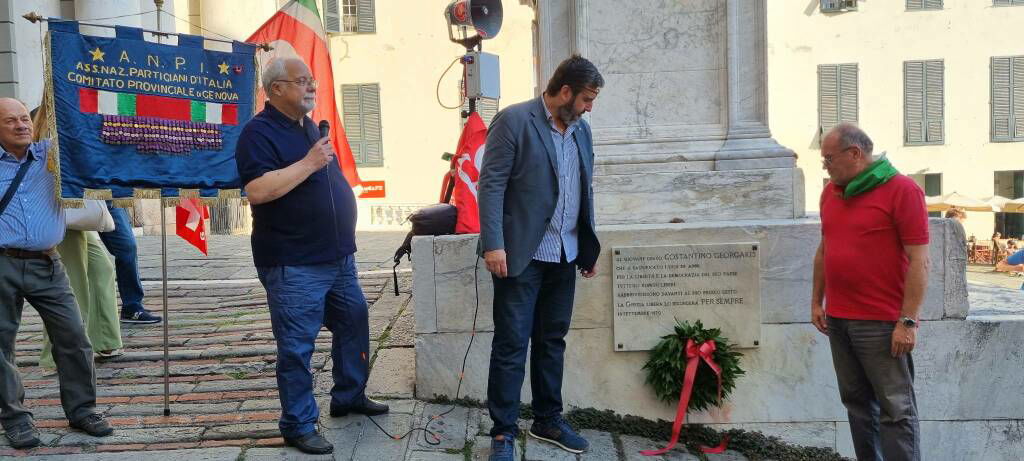
19 September 2022. The good people of Genoa preserving the memory of Kostas -52 years after he died.
If you happen to subscribe to Apple music or Spotify, you might like to listen to the following
Caro Theodorakis... Iva di Iva Zanicchi su Apple Music
Spotify – Caro Theodorakis... Iva
The Ballad of Mauthausen di Niki Jacobs & Mikis Theodorakis su Apple Music